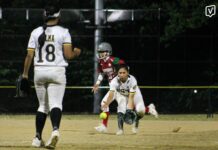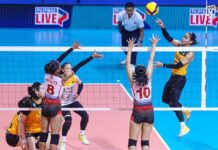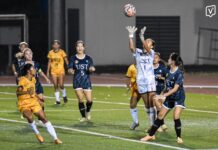UST ATHLETIC officials have no choice but to scrap the two-year residency rule after lawmakers passed the Student Athlete’s Protection Bill and encroached upon collegiate sports.
Institute of Physical Education and Athletics (IPEA) Department Secretary Gilda Camus said the University’s position won’t matter anyway as lawmakers had made up their minds.
“Whether we approve or disapprove, it’s a law. We have no choice but to implement it,” Camus told the Varsitarian.
The bill was approved by both chambers of Congress last June 10. It limits the residency requirement imposed on student-athletes in any athletic association, like the UAAP, to a maximum of one year for college athletes who will transfer from one member-school to another. For high school athletes transferring to a different school or university, no residency shall be imposed.
Senate Bill No. 2226 also limits the incentives a school can offer to student-athletes to tuition, lodging, medical services, life insurance, uniforms and equipment, and “reasonable” allowances to prevent “piracy.”
According to Sen. Pia Cayetano, author of the bill, the root of athletic piracy are the extravagant offers to student-athletes and which this law aims to prohibit.
“The bill addresses this mainly by regulating and limiting the kinds of benefits and incentives that schools may offer to student-athletes,” Cayetano told the Varsitarian. “It also prohibits other incentives ‘which are contrary to the nature of amateur sports’ and ‘may result to the commercialization’ of the student-athlete. This is precisely because one of the objectives of the proposed law is to address piracy in a manner that must not be at the expense of the rights and well-being of the student-athletes.”
Regarding the “reasonable allowance” that a school can offer to its recruits, Cayetano explained that it should be interpreted in its most simple meaning.
“The word ‘reasonable’ should be taken in its ordinary meaning which is one that is appropriate, fair or moderate. But reasonableness may also depend on a number of factors such as, but not limited to, the school’s capacity to provide and the student-athletes needs. So, once the bill is signed into law, guidelines to determine ‘reasonable allowance’ will be further discussed and laid out through its implementing rules and regulations,” she said.
Finally, Senator Cayetano revealed that erring schools may receive a hefty fine aside from the possibility of facing suspension from their respective athletic associations depending on the gravity of offense if found guilty.
In a Varsitarian article published in July 2014, IPEA Director Fr. Ermito de Sagon, O.P., said the proposed Student-Athletes Protection Act might not be able to stop schools from providing unwarranted benefits to recruit players.
“I don’t think this bill will solve the problem because any school or university can deny the fact that they are giving excess incentives to their athletes,” de Sagon said.
Under existing rules, a student-athlete from a UAAP school who moves to another member school must serve two years of residency before representing the new school, unless given clearance to play by the former school.
UST has lost numerous blue-chip and homegrown athletes in sports such as volleyball, tennis and badminton due to piracy by other universities.
Camus said the University would not file complaints against other schools offering incentives beyond those set by the law. UST will not release large amounts of money to lure athletes either, she added.
“It’s their (other schools’) choice kung mag-o-offer sila ng higit sa kaya nating ibigay. Basta tayo, we give what we can and kung ano lang ‘yung dapat. Hindi na natin kailangan magreklamo,” Camus added.
In 2010, two-time UAAP juniors’ volleyball most valuable player Alyssa Valdez left UST for Ateneo de Manila. That time, she had only served only a year of residency as the so-called “Jerie Pingoy rule” had yet to be implemented.
Valdez has since won two UAAP titles with the Ateneo Lady Eagles.
The UST Golden Tigresses have failed to enter the Final Four in the last three years.
In Season 76, decorated high school swimmer Mikee Bartolome played for the University of the Philippines Fighting Maroons despite failing to secure a clearance from UST. A temporary restraining order allowed Bartolome to compete.
The UST Female Tigersharks went on to boycott the entire competition. De La Salle University, Adamson University, and the University of the East also protested, but only skipped events where Bartolome competed. Angelica P. Abello, Karl Cedrick G. Basco And Josiah Darren G. Saynes

















